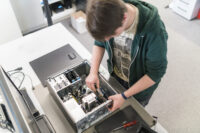David Wilson is the Principal/CEO of GEMS Wellington School Qatar. His focus is to instill traditional values in students under his care and to ensure the school reflects and delivers the very best elements of a British-style international education. Wilson joined the school in 2021 from his previous position as Vice-Principal at GEMS Winchester School – Abu Dhabi, where he oversaw significant school improvements.
He has worked in education for more than 20 years in a wide range of established and new schools in the UK and other parts of the world, including New Zealand, Spain and latterly the UAE. He began his career as a secondary physical education and maths teacher, and was quickly appointed to pastoral and curriculum leadership roles as Head of Year and subsequently Head of Department. Since then, he has worked as Head of School across both primary and secondary schools, and as Vice-Principal and Principal, amounting to over 10 years in senior leadership positions. He has also achieved the renowned National Professional Qualification of Headteachers (NPQH).
In the UAE, Wilson was the founding Head of Secondary and then Principal of Horizon International School in Dubai.
It was during his first teaching position at a school in the UK that Wilson really developed his passion for and commitment to ensuring all students receive the best possible opportunities to succeed and reach their potential.
David has successfully led high-performing teams in the pursuit of improving student outcomes and fostering a supportive, cohesive working environment. He firmly believes in the importance of self-discipline, setting high expectations and creating a culture of success and achievement, both for staff and students alike. He is passionate about providing every student with the best opportunities to succeed, in school and beyond, academically or otherwise, as well as supporting them as they navigate through an increasingly complex and rapidly changing world.
Education Middle East spoke to Wilson about his journey as an educator, advice to new teachers who have just started their career, teacher wellbeing and more.
You have extensive experience in teaching and being in senior leadership positions. Which role did you enjoy the most and why?
I am a vocational educator, and I’ve been extremely fortunate throughout my career to work alongside some exceptional colleagues, so this question is very difficult to answer. Whichever role I reflect on, the overriding priority has always been to ensure that my actions have had a positive impact on the quality of education the students receive. I can honestly say that I have relished every role I have held, whether it was teaching in the classroom, on the sports field or in a whole-school leadership position.
From being a specialist PE teacher, a Head of Year, a Head of Department through to Head of School and now Principal, I have contributed to the individual and collective successes of students, colleagues and, in some cases, parents. Being part of a school community creates a real sense of togetherness and belonging for all involved.
That said, if I were to point to just one favourite role, I would say my current position as Principal. As a teacher, I was passionate about improving the lives of the students I taught but now as a school leader, that extends to everyone in our school community. I have the pleasure of not only working alongside fantastic students, teachers and parents each and every day but also having the capacity to lead, inspire and shape the direction of the whole school community. This is an amazing privilege, and I wouldn’t want to do anything else. No one day is the same and whatever challenges arise, you know can make a positive difference.
In your career spanning 20 years, what has been one of your greatest contributions to the schools you have worked for?
I have been in education for over 22 years and have had the privilege of working in a variety of schools across a range of roles. Choosing just one contribution is difficult. I do, however, always go back to my very first teaching role as a newly qualified teacher. I was extremely fortunate to work with some very experienced and highly skilled teachers who really cemented my passion for teaching. I spent a lot of time observing how they interacted with students, developed strong relationships and set high expectations.
After my first year of teaching, I became a Head of Year, responsible for the pastoral care and wellbeing of 180+ students. Some children unfortunately came from deprived backgrounds and had challenging home lives, meaning education was not always their main concern. Ensuring school provided a space for them to feel safe, with consistent support and expectations, allowed them to learn, feel supported and, over time, trust me to work in their best interests. This role came with significant responsibilities but equally gave me immense satisfaction, as I was able to witness first-hand, and be a direct part of, how students turned their lives around. Many years later, seeing how many of them have gone to achieve great things and live exciting and fulfilling lives is wonderful.
Now, as Principal, I am able to take that very same passion and commitment and use it to positively impact the whole school community, with the support and dedication of an amazing team of staff. In the past 18 months alone, WSQ has achieved CIS accreditation, been rated as providing an excellent standard of education by BSO, developed a number of high-quality external partnerships, introduced and completed our first year as a High Performance Learning school and received outstanding GCSE results.
You began your career as a PE teacher. How has PE teaching changed since then?
When I started teaching PE over 20 years ago, there was greater focus practically on the development of physical skills, tactics and strategies and how these could be applied across a number of different sports and activities. The theoretical side of PE looked at areas such as sports psychology, anatomy and physiology, the history of sport, etc. While this has still remained the same, two significant developments in PE have been the enhanced use of technology and the increased focus on children’s physical and mental health. Technology, when used effectively, has enabled both PE teachers and students to observe, analyse and evaluate skills and performances in far greater depth and to a level that was not possible before. Real-time visual feedback can be provided, allowing immediate corrections to be made.
Equally, never has it been more important to educate our younger generation on the importance of physical activity and how to live a healthy life. As we continue to see growing rates of obesity and mental and physical health issues in young people around the world, participating in regular exercise and being able to make informed decisions on how to stay healthy are critical. For some children, PE and sport in school may be the only exercise they get, so maximising these opportunities should be at the top of every school’s agenda. It is widely accepted that regular physically activity and a healthy diet increase students’ confidence and allow them to feel better about themselves, in turn improving their overall wellbeing. This greater feeling of wellbeing also has positive benefits on their academic outcomes.
What advice would you give to new teachers who have just started their career?
For me, teaching is a vocation. My advice to aspiring teachers and those in the early stages of their career in education is to be passionate and love what you do. Consider your chosen profession as a craft, requiring skill that can continually be developed. You should always want to be the best you can, remain open minded, observe others and learn, learn, learn.
There is no question that teaching done properly is hard work, but this should not be seen as a negative. As with anything, the more you put in, the more you get out. The satisfaction you feel when your students make progress, grow and succeed makes it all the more worthwhile. Never lose sight of the fact that you are shaping and inspiring the next generation.
Teachers who have just started their career may also feel the pressure to push themselves forward and look for their next step of career development. Although career development is important, it is not a race. Enjoy the time in your classroom and really focus on mastering the art of teaching and becoming an expert practitioner.
Finally, always maintain high standards of professionalism when dealing with students, parents and colleagues. Remember that, as a teacher and role model, you are always being observed: your actions and behaviours are magnified, so ensure you use that privilege in a positive way.
You have obtained the National Professional Qualification of Headteachers (NPQH). Can you tell us how it can help teachers who aspire to be heads of schools.
The NPQH helps prepare future principals by providing opportunities for new learning relevant to the many aspects of the role. It can also be useful for first-time principals as a way of reflecting on current and previous experiences. Lots of rich learning resources, reading materials and tasks are provided, covering areas such as real-life case studies, research-based articles, leadership models, financial and strategic planning, school improvement, etc. For me, the most valuable aspect was the opportunity to discuss and connect with others on the course, being able to share thoughts, ideas and reflections as well as the informative 1:1 coaching sessions with my mentor. The fact that all the research is then used and applied in your whole-school improvement project allows you to put what you’ve learnt into practice.
At GEMS Wellington School – Qatar, how do you help your students develop real-world practical skills?
In today’s rapidly changing and complex world, it is impossible to know for sure exactly what the world will look like in, say, 10 years’ time. This means it is vitally important that we ensure our students have the right mindset, skills and behaviours that will enable them to adapt and evolve in line with the speed of change in the world. That is why at WSQ, we design our curriculum in such a way that it focuses on not just the development of knowledge but also how this knowledge can be applied in real-world situations. Creative and engaging learning opportunities are provided to further support this through trips, visits and the development of world-class partnerships.
As a High Performance Learning school, we apply the aspirational philosophy that every student can achieve highly by adopting and utilising a set of agreed behaviours and learning attributes. The success of the HPL framework is that it can be applied to any stage of a person’s life, not just education. This means that WSQ students will enter the wider world with a level of resilience, adaptability and a mindset that will allow them to flourish in their chosen futures.
Can you tell us about the recent Year 11 GCSE results of the school and explain how you go about achieving outstanding results.
We had extremely high expectations and exceeded our targets across all areas. With 38% of all students achieving a grade 9/8 (A*) and 54% of students achieving a grade 9-7 (A*-A), we far surpassed the UK average.
This level of achievement is not down to luck; it is the result of a great deal of hard work and dedication from teachers and students alike. The results are the culmination of each student’s journey through school, each year building on the solid foundations established earlier.
At WSQ our teachers know their students extremely well and foster close relationships with their students’ parents. It is the quality of these relationships that creates a supportive, happy, trusting environment where high-level learning can occur. We use data from a variety of sources to create aspirational and challenging targets for our students to work towards. Our teachers then skilfully personalise their teaching to match the needs of each student, underpinned by the High Performance Learning philosophy. Any student who is falling behind their predicted levels is identified early and given additional specialist support. On top of that, the school exudes a culture of success, where we all aspire to be the best we can, making celebration and achievement the norm.
How important is teacher wellbeing at your school?
Teacher wellbeing at GEMS Wellington Qatar is extremely important. This is why we recently created our own Wellbeing Charter called “Live Well, Perform Well, Be Well…ington” and established our own staff wellbeing committee. The purpose of the committee is to explore how we can further enhance our staff wellbeing and ensure we are all staying true to our charter.
As a school, we focus a lot on high performance with our students. To achieve this, however, we must ensure our teachers are able to work optimally each and every day. Our charter not only focuses on what we can do as an organisation to maximise wellbeing among our staff, but also addresses how we as individuals are responsible for our own personal wellbeing. All our work is supported and underpinned by widely accepted research and proven methodology, along with the findings and recommendations of our committee. We fully appreciate that our teachers are the biggest and most valuable resource we have, so their wellbeing is of utmost importance to us.








